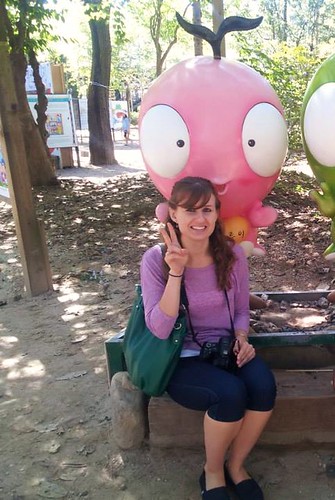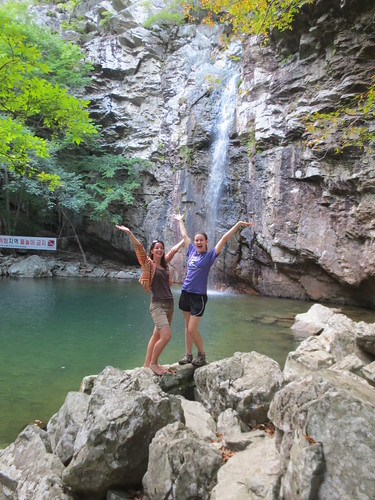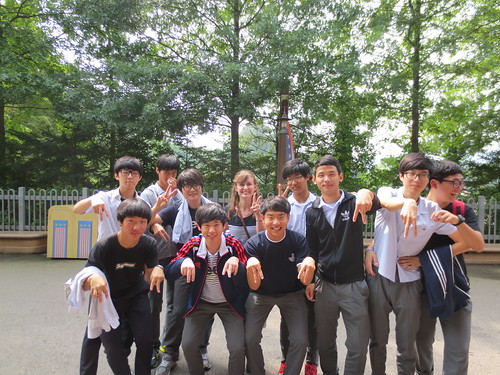Interview With Sarah Steinmetz, An American Teacher In South Korea

We are joined once again by one of our teachers who has kindly taken time to answer a few of our questions. This time we interviewed Sarah Steinmetz, a New Hampshire girl teaching English in South Korea. Here she tells us all about her time spent in South Korea so far.

As a New Hampshire native, I am a New England girl at heart. I graduated from the University of New Hampshire in 2011 with a degree in History. After finishing my undergraduate degree, I continued my education and received my master’s of Secondary Education in 2012. After I finished grad school I was really eager to travel and I began to look into teaching abroad. However, I unexpectedly landed a teaching job at a high school in New Hampshire so my plans for traveling were put on the back burner for a year.
After teaching for a year, I had no doubt that teaching was the career for me, but I still felt like I needed to break out of my American bubble and see more of the world. I loved my job, but I realized that if I didn’t seize the opportunity to travel I would regret it. I took a huge leap of faith and came to South Korea in August. I’ve been here for three months and so far I have no regrets about my decision to move to the other side of the world!
How have you enjoyed teaching in South Korea to date?
I’ve only been in Korea for three months, but so far I have really enjoyed teaching English in Korea. Everyone welcomed me to my school, and I have an awesome group of students that I get to work with. I taught in America before coming to Korea, but this has been a totally different experience. The education system in Korea is quite different from the system in the US, not to mention the fact that I had no previous experience teaching English. Adapting to a new education system, a new school, and a new content area has taken some time to get used to, but my students have really made the effort that went into adjusting worth it. Getting to know my students has by far been the best part of teaching English in Korea. Now that I know more about the personalities of my students I feel much more comfortable in the classroom than I did when I first arrived.
I think the most important thing that anyone interested in teaching English abroad should know is that it’s not as scary as you think. Before I moved abroad I remember having a lot of doubts about whether or not I was doing the right thing. I had never lived abroad and I was leaving behind a great life in America. However, since I’ve been in Korea I’ve no regrets about deciding to come here.
One of the major realizations I’ve had since I’ve been here is that it’s really important that you don’t let your fears limit your life. Many times we don’t do things because we’re afraid. However, once you face your fears you almost always realize that it’s not as scary as you originally thought. That’s how moving to South Korea felt for me–I was really nervous until I got here, and then I realized that I really COULD do it and it wasn’t even scary anymore. Facing your fears and taking in new experiences is really empowering. Now that I’m in Korea I now feel like I can travel anywhere or try anything. If living abroad is your dream, then don’t limit yourself. Take the steps to create the life you want to have.
Once you’re in Korea, make sure you keep an open mind. This might sound like a given, but I’ve met a lot of people who get really frustrated with the differences in culture and have let it negatively affect their opinions of Korea. You have to expect that things are going to be different, and sometimes this is going to inconvenience you. It’s OK to get frustrated at times, but learn how to take a minute to get over it, go with the flow, and take things for what they are.
If you come to Korea with tons of ideas about how things SHOULD be, it’s going to affect your experience in a negative way when unexpected and surprising things happen (as they surely will!) Learn to appreciate things for what they are and appreciate what you can learn from the cultural differences. If you keep a positive attitude people will be much more receptive to you, and it’s going to make your experience much better.
Can you tell us about a particularly powerful moment in your classroom?
I can’t think of one moment in particular, but recently I have been doing speaking tests with my students. I’ve been administering the tests by talking to the students one at a time and asking them each a few conversation questions. This has been a fascinating experience for me because for the first time I am getting real insight into their thoughts about school, their interests, Korean culture, and their futures. I feel that through this I have come to understand both my students and Korean culture much better, and I think as a result I’m going to be a better teacher for it.
What are the positive and negative aspects of living in South Korea?
There are many positive aspects to living in South Korea. First and foremost, the people are extremely kind and generous. Occasionally you might meet people who aren’t as friendly or who don’t like foreigners, but this has been a VERY rare occurrence for me. Since I’ve been in Korea, I’ve been constantly amazed at how people will go out of their way to help me. Korean people love to share, and it seems that almost daily I am given some sort of snack in the teacher’s room.
Another positive aspect of living in South Korea is that it’s a great mix of traditional culture and modern cities. The cities are some of the most modern in the world, but you’re also never far from beautiful mountains, Buddhist temples, or traditional Korean food. It’s really interesting to see the fusion of traditional culture and modern trends. People in Korea observe traditional social rules like bowing to elders or using two hands to give or receive an object, but they simultaneously love K-Pop and aren’t shy about the role of plastic surgery in the country. It’s a fascinating combination of old and new.
Before I came to Korea I don’t think I fully realized how beautiful this country is, but I’m always amazed by the awesome mountains that are everywhere . Additionally, the amazing transportation in Korea means that you’re never far away from anything in Korea–you can easily go from the bustling cities to the serene atmosphere of the mountains in a short amount of time.
I haven’t encountered too many negative aspects of Korea that you wouldn’t find in any other country, but there are certain things that come with living abroad. It isn’t always easy to be an expat, and there are certain times when you have to deal with homesickness whilst living abroad. You have to make certain sacrifices when you live abroad, and many times this means missing important occasions like weddings or major holidays with your family.
Homesickness comes with the territory of living abroad, but I think of it as the price you have to pay for the unique opportunity of experiencing a new culture. Although I love Korea, there have been times I wish that home wasn’t quite so far away. I try to stay connected with home the best I can through Facebook, Skype, Kakao, etc. Technology has made it pretty easy to keep in touch with my friends and family at home, even with a 14 hour time difference!
Another somewhat difficult aspect of living in South Korea is that sometimes you have to work within a system that you don’t fully agree with. Since I studied education and taught in America, I came here with a pretty strong philosophy of teaching. However, the philosophy of education in Korea is quite different from my own.
I try to do my best to work within the system, but sometimes it’s difficult to see the amount of pressure put on the students. I try to do my best to make my class inviting and engaging for my students, but sometimes it feels like I’m fighting a losing battle because students are so tired. My students are at school until 10 PM, and many times they stay up even later than that to study more. It’s taken some time to adjust to a school system that places so much pressure on students.

I’ve only been here for three months, so I haven’t had much of a chance to travel yet. I have been to some parts of Korea including: Jeonju, Ulsan, Andong, Nami Island, Chucheon, Woraksan National Park, and Seoul. Later in the month I’ll finally make my way to Busan and Daegu, and over my winter break I’m hoping to go to Thailand. I’m really anxious to do some more traveling throughout Asia and I hope to eventually travel to Vietnam, Cambodia, Taiwan, China, Japan, and who knows…maybe more!
How do you like your school in general?
I really enjoy working at my school. I’m lucky enough to work in a high school with really motivated students, and the more I get to know them the more I love going to work each day. The faculty and staff at my school have also been very kind to me, which has made my transition to life in Korea much easier to deal with. Overall I am really satisfied with my working conditions, and I feel really blessed to be surrounded by people who I enjoy seeing each day.
Is there anything else you’d like our readers to know about?
Traveling is truly an eye-opening experience. When you travel you’ll be amazed by how even everyday tasks are done differently in other countries. Before coming to Korea, I read a lot about the country and the culture, but living here has been unlike anything I could have imagined.
Reading about something can give you knowledge, but living something leaves an indelible mark on your perception of the world. When you make friends with people from a country that you’ve previously only heard about on the news or read about in a book, it makes you realize that really the only thing that separates us is distance. There are lots of amazing people out there. If you never travel you will never meet them.
I think those of us who are native English speakers are extremely privileged right now because we have countless opportunities to experience new cultures and live comfortable lives while we travel. It’s a really amazing time to be able to experience the world, and I really encourage others to take advantage of this opportunity.
Do you have any favorite blogs or websites about South Korea that you’d like to share with our readers?
If you have any questions about teaching in South Korea, please feel free to contact me or read about my experience on my blog: Sarah Goes To Korea




